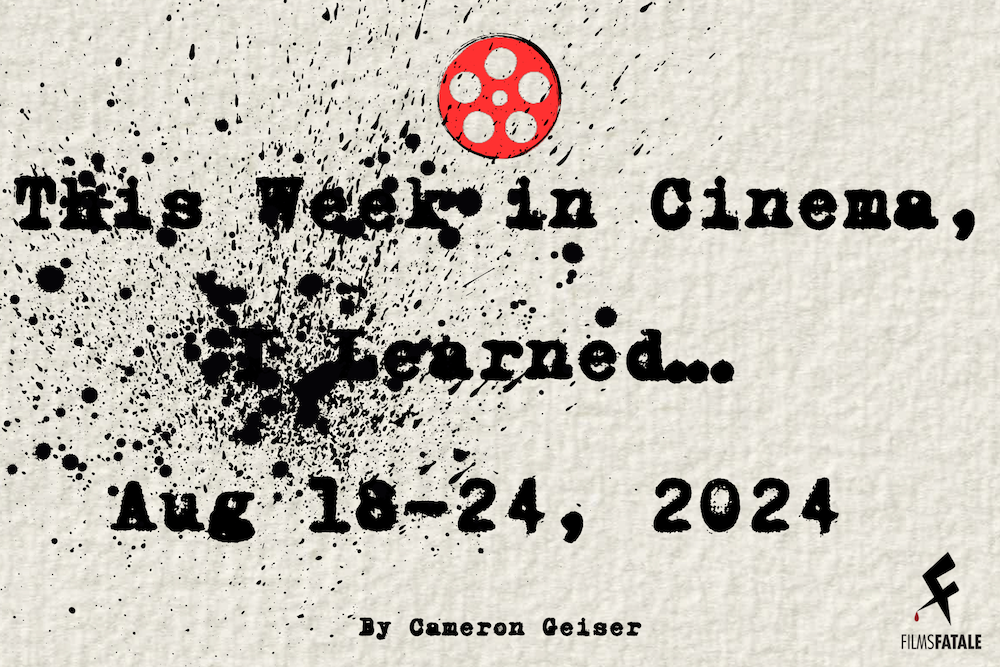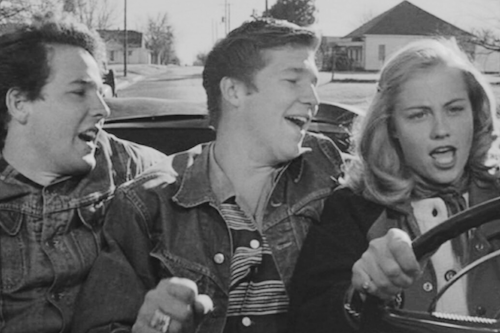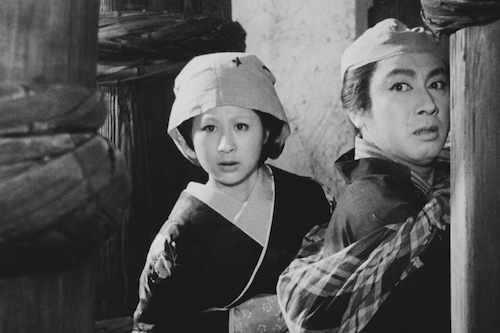This Week in Cinema, I Learned…Aug 18-24 2024
Written by Cameron Geiser
Welcome to This Week in Cinema, a yearlong film criticism project wherein I will be watching a new film that I haven't seen every single day.
This week in cinema, I learned that sometimes you just have to go for broke and make what you can with what you have at your disposal. With the exceptions of Barry Lyndon, Fail Safe, and A Story from Chikamatsu, the majority of this week’s films come from the early careers of these masters of the cinematic arts. Knife in The Water is actually Roman Polanski’s first feature, whereas The Last Picture Show, Memento, and School Daze were all the second films of Peter Bogdanovich, Christopher Nolan, and Spike Lee. All of these films had that scrappy celluloid grit about them, these filmmakers had something to say, something to prove. The remaining films from Stanley Kubrick, Sidney Lumet, and Kenji Mizoguchi were all the work of master filmmakers refining their style, visual language, and narrative focus. Whether you’re at the beginning of your career, or nearing the end of it, it seems that a key defining trait of a lot of filmmakers in the twentieth century was sheer determination. Determination to get films made, but also in the ability to loop back into controlled passion over budgetary and profiteering concerns. Which is part of the reason I’m ecstatic to see Francis Ford Coppla’s Megalopolis once it actually hits theaters later this September, but that’s another story for another time.
August 18th
Knife in The Water (1962)
3.5/5
Roman Polanski’s first feature length film, Knife in The Water, is a cramped paranoia thriller that adds a third wheel to a married couple's travels when they pick up a hitchhiker on the way to a rural marina. It's a simple tale of tension in a tight space, but one that's utilized efficiently. Polanski does a few subtle things with the plotting that make it inherently intriguing as we watch everything unfold, waiting for the conflict that will surely come. First, the way the young drifter (Zygmunt Malanowicz) hitchhikes is insanely risky by darting out in front of cars that hopefully have enough time to stop. The aloof wanderer represents more of Polanski's own instincts in that high risk, high reward style. He did survive the Holocaust through grit, cleverness, and a keen eye for details after all. Because of this, he positioned the three characters in such a triangle as to have the drifter compete with the Husband (Leon Niemczyk) for the attention of his wife (Jolanta Umecka). The Husband represents tradition, convention, moneyed interests while the demure and uninterested wife is the two men’s mutual desire so not only is there conflict through male posturing, but also by colliding social statuses. Certainly an interesting first feature length effort, obviously his later work is what would enrapture audiences worldwide with the likes of Repulsion, Rosemary’s Baby, and the all timer with Chinatown.
August 19th
Fail Safe (1964)
4/5
Sidney Lumet's Fail Safe is a tense Cold War thriller that explores the insanity of mutually assured destruction. Sidney Lumet wisely focused on just how precisely every step of escalation in our technological system could go wrong at the exact right moments for maximum dread and tension. Between several ongoing story threads that all eventually collide, we examine the people in power whose decision making skills, patience, and common sense all matter gravely to the continuation of the human race. There's some interesting performances from Henry Fonda as the calm, collected and resolute President of the United States while Walther Matthau starred as Dr. Groeteschele, a macabre elitist based on the real life political scientist Herman Kahn; a noted futurist and military strategist that advocated such atrocities as a “Winnable” Thermonuclear War. Dan O'Herlihy played General Black, or “Blackie” as he's referred to, who also has some interesting performance choices as longtime friend of the President and the man that must commit to the unthinkable once all hope is lost. With films like 12 Angry Men, Dog Day Afternoon, and Network under his belt (just to name a few) Sidney Lumet is a name you should know if you're interested in film history or filmmaking broadly. I also highly recommend his book, Making Movies.
August 20th
The Last Picture Show (1971)
4/5
Peter Bogdanovich's The Last Picture Show is a story of high school drama in a small desert town. The story follows a small ensemble of teenagers engaging in awkward sexual promiscuity and discovering the joy, disappointment, and complexity of becoming an adult. Sonny (Timothy Bottoms), Duane (Jeff Bridges), and Jacy (Cybill Shepherd) are the three teenagers that get the largest chunk of the story, but there's plenty of moments when the adults in town dole out some sage wisdom too. This is mostly from Sam 'The Lion' (Ben Johnson), the owner of the local pool hall, theater, and cafe. Lois (Ellen Burstyn), Jacy's Mother, also surprises with more charm and depth of character than you'd expect given the films focus on the younger generation for most of the runtime. The Last Picture Show is about that tender period of life when nothing makes sense and yet there is possibility everywhere. There's an inherent sadness in the script and in several of the performances that seem to urge the audience to risk it all to find happiness and love in life, not to fall into inaction for fear of failure. It's a charming film, definitely worth a watch. I also recommend one of his books, Who the Devil Made it? Conversations with Legendary Filmmakers. I found it to be a fun, illuminating, read.
August 21st
Barry Lyndon (1975)
4/5
Stanley Kubrick's Barry Lyndon is a Rococo painting come to life. Stanley Kubrick was a fascinating filmmaker, and one that I've come to appreciate more over time, but there are still some films of his that I just don't care for. However, while this film wasn't exactly my cup of tea it is objectively a very good film. Set against the Seven Years War in Europe, the story follows the titular Barry Lyndon (Ryan O'Neal) as his life progresses from birth to death and all the cold, calculating manipulation and subterfuge that accompanied him through his rise and fall from prominence. Maybe it's the detached, unemotional, distant performances from Barry and others surrounding him, but I never really synced with this film or its vibe. At three hours long, set in perhaps my most uninterested era of history (It's mainly the visual aesthetics of the time that I dislike and the focus on the powerful socialites in Europe that feel devoid of any humanity), this one wasn't for me, but it is a technical masterpiece.
August 22nd
Memento (2000)
4.5/5
Christopher Nolan's Memento is a neo-noir mystery thriller that takes a unique premise and makes both the characters and the audience question the fabric of reality itself. At least within the film's confines that is. This is one of those movies that I immediately knew, I'll have to watch this one again to grasp everything a bit better. Memento follows Leonard (Guy Pearce), a man with a brain condition he got in an accident that has affected his short term memory. Meaning he cannot make new memories, so about every ten to fifteen minutes his etch-a-sketch mind is shaken and he has to figure out what the hell he was doing just now, and why. The film is particularly brilliant because we experience the film from Leonard's perspective and the story is structured around changes in his dilemma and how he receives new or old information, and how those around him manipulate him once they know about his situation. The two main characters that manipulate Leonard, rightly or wrongly, are Natalie (Carrie-Anne Moss) and Teddy (Joe Pantoliano).
Their relationships with Leonard evolve constantly as we see how he can become trapped by his condition and taken advantage of, but also with us, the audience, separately and simultaneously. It feels like doing any further plot discussion would only lessen the quality of your viewing experience if you haven't caught this one yet like I hadn't, however I will note that the inherent sadness in the film in relation to Leonard's situation specifically was incredibly well done. This throughline of sadness connected to realizations about time and the human experience itself, the short span of life that we have to do everything we can in, it feels as though this notion is within most of his work since Memento. Highly recommended.
August 23rd
School Daze (1988)
4/5
Spike Lee's School Daze is a Musical Comedy set during Homecoming weekend at the fictional Mission College, a historically Black College in Atlanta that's intentionally similar to Morehouse, from which Lee himself graduated. The story focuses on the Gamma Phi Gamma fraternity, the returning students, and the new pledges that must survive the physical and emotional damage of hazing. The balancing act of a plot has on one end Dap (Laurence Fishburne); an activist intellectual in political leadership waging a war of ideas against the more conservative administration. The other end of this balancing act is twofold through the characters of Julian (Giancarlo Esposito) and Half-Pint (Spike Lee). Julian is the frat leader obsessed with a strict set of social status rules, whereas Half-Pint is Dap’s younger cousin and one of the pledges under Julian’s thumb. As in most Spike Lee films, the director cleverly, and clearly, shows the audience uncomfortable truths and makes us confront all sorts of issues that polite society would never willingly entertain in the discourse, especially in the 1980’s.
He has two factions of female students perform an entire 1950’s style musical number on the subject of straight versus curly black hair, they even cover skin color differences. Spike Lee wisely takes the sex comedy structure and flips it on its head by showcasing the painful and emotional damage in one scene where Julian learns of Half-Pint’s virginity and “offers” his girlfriend, Jane (Tisha Campbell) , to him making it known that this Frat only takes “real” men. Instead of playing the story beat triumphantly, it’s quieter, somewhat disgusting, and we feel bad for Jane not only because of how the scene is played but because Julian dumps her after that for prioritizing the fraternity over him. Which feels insane. School Daze was more interesting than expected, the musical sequences and the blocking within them once again showcase Lee’s deep knowledge of Hollywood classics, genre nuances, and how to make something new from the mold of the old. It’s worth the watch.
August 24th
A Story from Chikamatsu (1954)
4.5/5
Kenji Mizoguchi's A Story from Chikamatsu is a story set in Japan's past featuring what feels like a more interesting version of Romeo and Juliet (I don't like Romeo and Juliet). This delightful indictment of societal oppression was even commented on by Akira Kurosawa as “a great masterpiece that could only have been made by Mizoguchi”. That was enough for me! I’ve only seen one other Mizoguchi film, Ugetsu, which was certainly powerful and intriguing (and highly recommended), but I’ve known that his other works more famously focus on female characters and their perspectives. Mohei (Kazuo Hasegawa), the apprentice of scroll maker Ishun (Eitarô Shindô), gets wrapped up in false illicit allegations as does Ishun’s wife, Osan (Kyôko Kagawa).
When the two decide to flee together, it isn’t until they’re out on a lake preparing to kill themselves that they realize that they do actually love each other. Mizoguchi carefully creates all the slight mistakes and misunderstandings that bring Mohei and Osan to their eventual tragedy. A Story from Chikamatsu (alternatively titled The Crucified Lovers), does a lot of subtle things in the performances, and how the world outside of Mohei and Osan reacts to and causes a lot of their problems, that combine to form a quietly rebellious diatribe against the sins of the past, and I dug that. There are several titles from Mizoguchi that I still need to see, notably: The Story of the Last Chrysanthemum, Sansho the Bailiff, The Life of Oharu, and Utamaro and His Five Women. If you haven’t heard the name Mizoguchi, he seems to be among the best auteurs of cinema, and I encourage you to take a look into his work.
Cameron Geiser is an avid consumer of films and books about filmmakers. He'll watch any film at least once, and can usually be spotted at the annual Traverse City Film Festival in Northern Michigan. He also writes about film over at www.spacecortezwrites.com.










